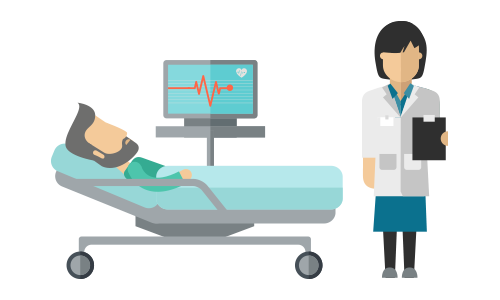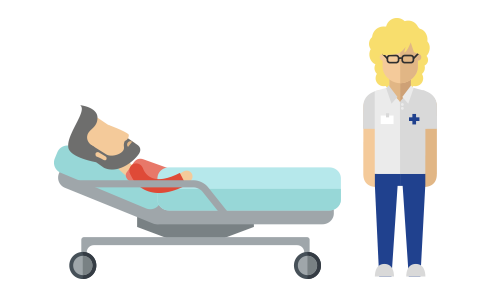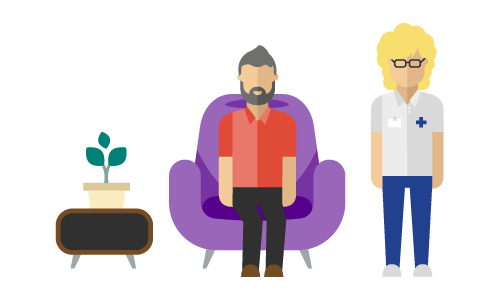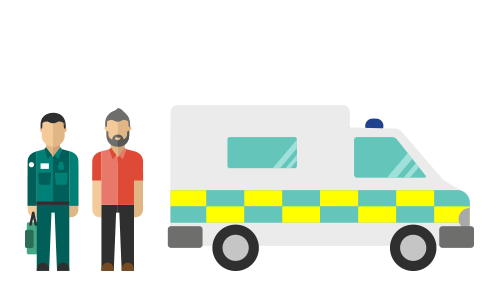Major Trauma – the patient journey
A major trauma patient’s journey generally spans three principal overlapping phases which are: pre-hospital, in-hospital and rehabilitation. The ‘in-hospital’ phase may include inpatient stays at more than one hospital.
1. Pre-Hospital Phase
The period of time immediately following the incident is known as the ‘pre-hospital phase’. Patients are conveyed to hospital in a number of ways; a friend or relative may bring you or an ambulance may be called. Serious incidents or accidents are sometimes attended by an air ambulance or a medical team. If an ambulance service or medical professional is called to attend you, a decision will be made about where to take you. Depending on the seriousness of your injuries you may be taken to a specialist centre (known as a Major Trauma Centre) or the decision may be to take you to the nearest hospital with an emergency department if your injuries appear to be less severe.
2. In-Hospital – Reception Phase

Upon your arrival at hospital you will be seen and assessed by a medical and nursing team. Decisions will be made regarding what investigations you’ll require (such as x-rays and scans). It is likely that you will have blood taken and receive painkillers if you require them. The investigations and results will be explained to you when they are available and a plan of care formulated.
Specialists may be called to see you in the emergency department (ED) to assist in the management and treatment of the injuries you have sustained. Sometimes the specialist will be at another hospital and a transfer to another hospital in an ambulance may be necessary.
If you require an operation or procedure, this will be explained to you. Once it is appropriate to do so you may be taken to theatre for an operation or admitted to a ward or the critical care unit for treatment or observation.
3. In-Hospital – Acute Phase
This is the time you spend on the ward. Some of this time may be spent in a critical care unit if your injuries are severe and you require extra support and close observation. The acute care phase may take place at your local hospital or you may have been moved to a Major Trauma Centre (MTC). These are specialist hospitals that are resourced to have specialist services in place and could be some distance from your home. The distance may make it more difficult for your friends and relatives to visit.
During your time in hospital you may require physical therapy and a physiotherapist will assess your needs and formulate a treatment plan to assist in your recovery. This is to assist in your recovery and will vary depending on your injuries and requirements. Other specialists such as speech and language therapists, occupational therapists and dietitians may be involved in your care. A multi-disciplinary team (MDT) approach is taken to ensure everyone works together with the shared outcome of making you well and assisting your recovery. This will continue until you are well enough to leave.
4. In-Hospital – Transfer to local hospital (if needed)

Once you have completed your episode of specialist care at the Major Trauma Centre the doctors may wish for you to be transferred back to a hospital closer to your home. This is known as repatriation. The purpose of repatriation is to move you closer to home and also allow other patients access to the specialist care at the Major Trauma Centre. Support from friends and relatives is seen as vital part of your recovery and visits are encouraged. Each ward area will have visiting times and these may be different depending on where you are. You can contact the hospital directly to check on the visiting times.
5. Discharge and Rehabilitation Phase

Following your treatment, and once the medical teams feel you are safe for discharge you may be assessed for your ongoing needs in the community. This may involve a visit from the occupational therapy team (who assist in your discharge by ensuring your safety and promoting independence in the community). They may provide aids to assist you, and will look at your activities of daily living (ADLs) to ensure you can complete simple tasks such as making a cup of tea and moving around your home safely. They may make plans to visit you once you are at home and can assist with ongoing needs. You may require a walking aid or regular therapy to ensure your progress is supported and continued at home. These are known as community teams, they may be supported by a district nursing team who can assist in wound care and ongoing medical needs.
Following discharge it may be necessary for you to attend the hospital for outpatient appointments. This is so your team can check on your on-going management and to make sure you continue to progress at home.
6. Recovery following major trauma
Recovery can be a long process. You may not be the same as you were before, you may require more rest, become tired easily and may find this frustrating. You may sometimes feel overwhelmed. This is a perfectly normal part of the recovery process, it’s helpful to speak to someone you are close to. Try to speak to a friend, relative or your GP if you feel this way.
The ‘After Trauma’ App is for survivors of serious injury and contains information, a diary, chatroom, and recovery tracker. You can find a demonstration of how to use the App on YouTube. Please click here to access the website where you will find details of the app.
If you, a family member or friend have been treated in hospital and have any queries/issues please follow the advice given on your discharge paperwork. You should find details for your point of contact there.
